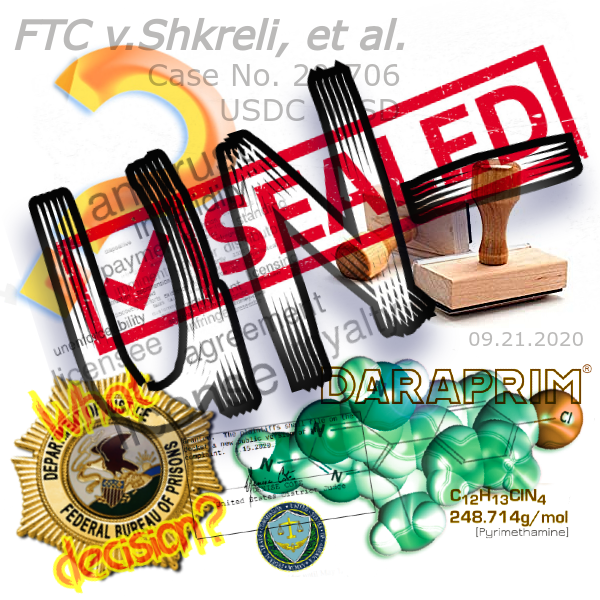 Regular readers know that we long-ago covered Mr. Shkreli's downfall at a separate property. This update is cross-posted here because it makes a nice counterpoint, to indicate what actual Sherman Act violations look like, in contrast to the preposterous claims of Parler and its counsel against the Amazon Web Services unit. It also sets out some sound advice for counsel to the boards of life science companies more generally, in the US. Here you go:
Regular readers know that we long-ago covered Mr. Shkreli's downfall at a separate property. This update is cross-posted here because it makes a nice counterpoint, to indicate what actual Sherman Act violations look like, in contrast to the preposterous claims of Parler and its counsel against the Amazon Web Services unit. It also sets out some sound advice for counsel to the boards of life science companies more generally, in the US. Here you go:
Martin (And Vyera/Phoenixus) Mostly Lose. . . On Whether Additional Sections Of The 2017-19 Board Minutes Must Be Disclosed To The FTC. . .
Not terribly surprising, but Vyera must turn over to the FTC additional sections of its board meeting minutes from 2017 and 2019 -- by this Friday, at noon -- especially as the same relate to the decisions to approve some extremely restrictive API supply agreements with a company called RL Fine. [Of course the FTC and States are seeking to prove that Martin intended to unlawfully restrain competition from generic versions of Daraprim®, by limiting access worldwide to pyrimethamine, the API needed to conduct FDA required reference testing to establish bio-equivalence for the putative generic.]
The practice tip here, for counsel to the boards of US companies, is to memorialize very clearly when anyone asks for legal advice, from a lawyer, during a meeting, and indicate that a lawyer responded with the requested advice. Unless counsel is preparing the minutes to create a record that s/he advised against a course of conduct as plainly unlawful -- it is rarely a good idea to set out what that advice was. In all other situations, the better practice is to simply recite that the board sought legal advice on a matter, fully discussed the merits and risks of the course of action, and (if true) agreed to abide by the legal advice offered, in taking the proposed course of action.
 That's how we do it -- out here, in the Big Leagues. It preserves a record that the the board acted responsibly, and that it was aware of the risks, and made a considered, non self-interested business judgment (protected, for example, under Delaware's so-called "business judgment" rule) in adopting or foregoing a course of action.
That's how we do it -- out here, in the Big Leagues. It preserves a record that the the board acted responsibly, and that it was aware of the risks, and made a considered, non self-interested business judgment (protected, for example, under Delaware's so-called "business judgment" rule) in adopting or foregoing a course of action.
In contrast, it seems Martin's counsel (or perhaps whomever served as the Board Secretary, at the meetings) at the time was uneven and slipshod, in describing the precise tenor of the discussions, and unless the minutes are inaccurate, the Secretary to the Board did not follow up to be sure a lawyer answered specific legal questions raised by board members. Had the Secretary so asked, it is a near certainty the lawyer would have given specific advice, and the minutes could have reflected that fact, while omitting additional detail.
 But -- and this seems likely here -- if counsel (at the Vyera board meetings) or the Board Secretary, directly, wished to preserve a record that the legal advice was strongly against a course of conduct thought to be clearly unlawful, many responsible lawyers I know would note that fact with specificity in the minutes (setting out the applicable law, and legal conclusions), if it seemed clear that the board was going forward with unlawful agreements (under US law), or otherwise impermissible restraints of trade (perhaps in this case, under EU law -- given the EU / Swiss domiciles involved). Of course, at most responsible companies, clearly unlawful conduct is never endorsed at board meetings, so there is rarely any need for making a "fail-safe" record.
But -- and this seems likely here -- if counsel (at the Vyera board meetings) or the Board Secretary, directly, wished to preserve a record that the legal advice was strongly against a course of conduct thought to be clearly unlawful, many responsible lawyers I know would note that fact with specificity in the minutes (setting out the applicable law, and legal conclusions), if it seemed clear that the board was going forward with unlawful agreements (under US law), or otherwise impermissible restraints of trade (perhaps in this case, under EU law -- given the EU / Swiss domiciles involved). Of course, at most responsible companies, clearly unlawful conduct is never endorsed at board meetings, so there is rarely any need for making a "fail-safe" record.
In any event, here's a bit from the cogently-reasoned 13 page order entered by USDC Judge Cote in Manhattan, overnight -- essentially granting the FTC access to about nine-tenths of the board minutes it sought as overly heavily redacted:
. . .The passages that must be disclosed do not reflect either a request for legal advice or the delivery of legal advice. Vernick begins the Meeting by informing the Board about discussions between Vyera and RL Fine. Then, in the first box on page 3, he describes a business rationale for the RL Fine collaboration and refers to information available to the Board about competitors. Nothing in the passage indicates that Vernick is providing legal advice. Similarly, in the second box on page 3, the Chair and a fellow director provide their opinion of the business rationale for a collaboration with RL Fine.
In the third box on page 3, Paragraphs 4 and 5 describe legal advice by Vernick and Däscher to the Board about the legal implications of the collaboration. The remainder of the third box does not describe a request for legal advice or the presentation of such advice. It contains the continued presentation by the Chair and a director of the agreement and, in the final paragraph, their recommendation that the Board approve the collaboration. It notes that the Chair and director have been informed of the legal risks, but it does not describe those risks. Finally, the box on page 4 does not contain a request for legal advice or a description of any legal advice. . . .
In the second paragraph, the CEO reports that he considers something to be inappropriate, and a Board member responds. There is no request for or delivery of legal advice. . . .
That last bit I quoted, above would have been the perfect moment for someone to turn to counsel, and have a recitation of actual legal advice, and so indicate -- and thus largely immunize the remark (which now the FTC is likely to make quite a bit of hay with) from disclosure, as part of a legal advice privileged exchange.
Again, though it may well be that the CEO at the time (not Martin) wanted to make clear that he was not signing up for unlawful conduct -- and so this is his defensive record, in any shareholder derivative suit.
 Hard to tell from the scant context -- but fascinating, just the same.
Hard to tell from the scant context -- but fascinating, just the same.
Martin is going to lose into the high tens of millions of dollars here, Condor sez.
Bank on it.
Onward -- smiling, in the chilly sunshine of the steel and glass canyons now. . . .
नमस्ते
















No comments:
Post a Comment